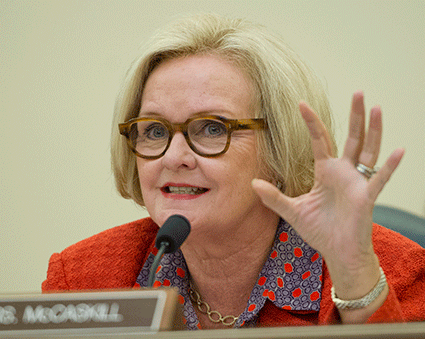Senate Subpoenas OTT Video Pricing Info
The smarter way to stay on top of the multichannel video marketplace. Sign up below.
You are now subscribed
Your newsletter sign-up was successful

WASHINGTON — The Senate Permanent Subcommittee on Investigations is sending subpoenas to cable operators and other multichannel video programming distributors (MVPDs) seeking information, including program contract information, related to over-the-top video service, according to multiple sources.
The Senate panel is the subcommittee with sweeping jurisdiction; its past investigations have included everything from trying to weed out Communists under chairman Joe McCarthy in the 1950s to rooting out the cause of Enron’s financial collapse in the early 2000s.
The information sought this time includes data on video pricing, one industry source said. That would make sense, given the presence of a pair of longtime cable price critics on the panel: Sen. John McCain (R-Ariz.), a member of the majority, and ranking member Sen. Claire McCaskill (D-Mo). McCaskill has criticized cable operators in the past over a variety of issues, and has asked for anecdotal evidence from constituents and others about their cable complaints.
Subpoenas for documents and records can be issued by any member of the subcommittee, so long as the request is authorized by the chairman and notice is provided to the ranking member — and in this case, that would be McCaskill.
Multiple sources said they understood McCaskill was a driving force behind the subpoenas. A McCaskill spokesperson declined comment, as did Matt Owen, chief counsel for the subcommittee.
LETTERS IN THE MAIL
An industry source who said the letters had gone to cable operators did not know whether they went to telco or satellite video operators as well. Another source said some cable operators and at least one satellite operator had received notices. All the major players were expected to receive them, that source said.
The smarter way to stay on top of the multichannel video marketplace. Sign up below.
A spokesperson for Comcast, the largest U.S. cable operator, had no comment. The National Cable & Telecommunications Association and American Cable Association, the cable industry’s two main trade groups, declined comment as well.
The Senate is widely expected to take the lead on video issues in Congress’s planned bicameral review of communications laws, and over-the-top video is expected to figure prominently in that review. The government is puzzling over how it should treat over-the-top video providers and how Internet-service providers — many of whom are also cable operators with traditional video offerings and their own OTT products — should treat them.
The Federal Communications Commission has made it clear that affording broadband access to competing over-the-top video providers will be a key factor in its reviews of proposed mergers among and between telco and cable ISPs, as well as with program distributors.
Programmers are coming off a federal court victory in which the U.S. Court of Appeals for the D.C. Circuit held that the FCC could not avail third parties to massive amounts of sensitive contract data in the Comcast- Time Warner Cable merger-review process. (That merger has since been scuttled.)
They now face the potential that such documents could be put in the hands of a committee that has had a history of strategic leaks, or that could produce those documents in the context of a hearing.
The investigation could take months as the targets of the subpoenas first try to figure out exactly what the subcommittee needs, in the interest of refining what they must provide. Senate staffers must then vet the information.
It is unclear how that information might be used — say, in upcoming hearings — or how the subcommittee will ensure that sensitive information is not shared (or hacked).
‘RATHER AGGRESSIVE’
One Washington, D.C.-based cable executive speaking not for attribution said the document requests could take a long time. And coming from the Investigations subcommittee, the source added, the move appeared more hostile than a matter of simple fact-finding for a planned Communications Act rewrite.
The source called the subpoenas a “rather aggressive” move.
The process, the source explained, is basically that the subpoenas are issued, then the targets — in this case, the MVPDs — start negotiating over which documents the subcommittee specifically needs, to try to understand what lawmakers really want and avoid over-delivering boxes of sensitive information. Then the Senate staff will have to absorb it.
Given what was understood to be the broad scope of the request, the source said, the subpoenas appear to be a lot of fishing for information — and what becomes of the info will depend on what the panel finds.
It was unclear what role the programmer side of those contracts would have in the process.
One unintended consequence of the request is that it could make industry players less amenable to frank discussions in planned Communications Act rewrite hearings in other committees, such as the Senate Commerce Committee, the cable executive said. It could also turn cable executives from friendly witnesses into ones in litigation mode, since they would no longer just be called to testify but would have to do so knowing members of Congress have highly confidential documents. He said it could make those executives less forthcoming, given they would have to calculate what they are saying in the context of what Congress already knows.
Contributing editor John Eggerton has been an editor and/or writer on media regulation, legislation and policy for over four decades, including covering the FCC, FTC, Congress, the major media trade associations, and the federal courts. In addition to Multichannel News and Broadcasting + Cable, his work has appeared in Radio World, TV Technology, TV Fax, This Week in Consumer Electronics, Variety and the Encyclopedia Britannica.

